10 Airtable competitors for specific use cases

Airtable is one of my favorite tools of all time. I use it to track personal finances, and we use it at Whalesync as our CMS. A few months ago, Airtable announced a $735M funding round at an eye-popping $11B valuation. With that kind of success comes competition. We've compiled a list of the top Airtable competitors going after the spreadsheet x database market.
These tools have each tried to carve out their own niche. Some are better for developers while others go after project management use cases. We've included superlatives(✨), so you can identify the tools that are relevant to you. While we don't plan on dropping Airtable any time soon, these Airtable alternatives can add tremendous value depending on your use case. Let us know what you think!
📌 As always, this list in no particular order. Each tool is awesome. 📌
Top 10 Airtable Competitors
1. NocoDB
Best open source Airtable alternative
Link: NocoDB
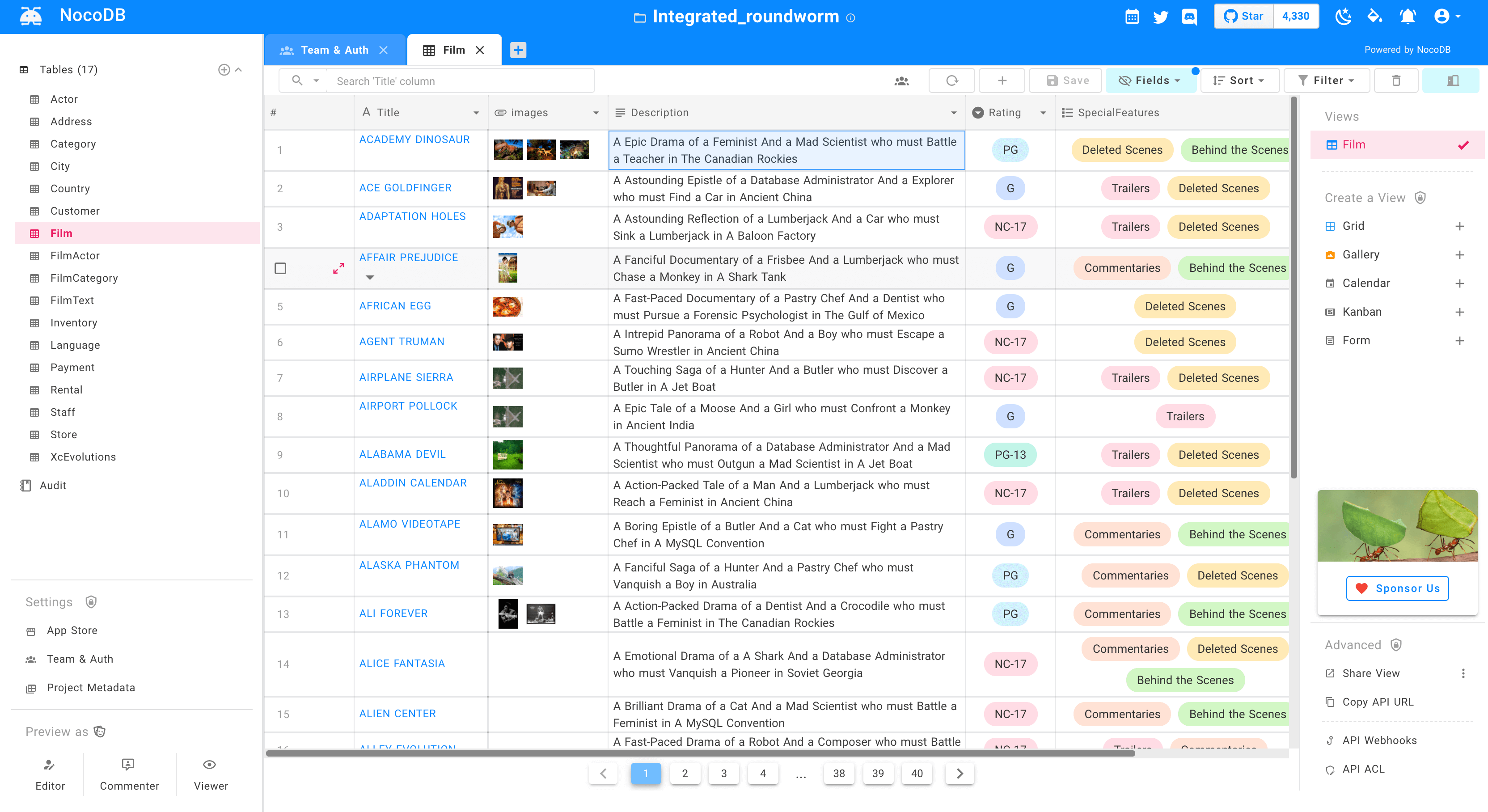
NocoDB says it all in bold letters at the top of their homepage: "Open Source Airtable Alternative." Using their open source code, you can create an end result that is very similar to Airtable. They offer views (kanban, calendar, grid, etc.) as well as filter, sort, and search. While not quite as advanced as Airtable's automations, NocoDB lets you automate with Slack, Discord, and a few others.
The product works by connecting to an existing SQL database. Using NocoDB you can add an Airtable-like UI to your PostgresSQL, MySQL, or Aurora DB. While relatively new, they've already amassed over 27,000 stars on Github and growing. When comparing to Airtable, their main selling point is being completely open source. There are a few other open source Airtable alternatives on Reddit, but so far NocoDB seems to have gained the most traction.
2. Rows
Best for formulas
Link: Rows
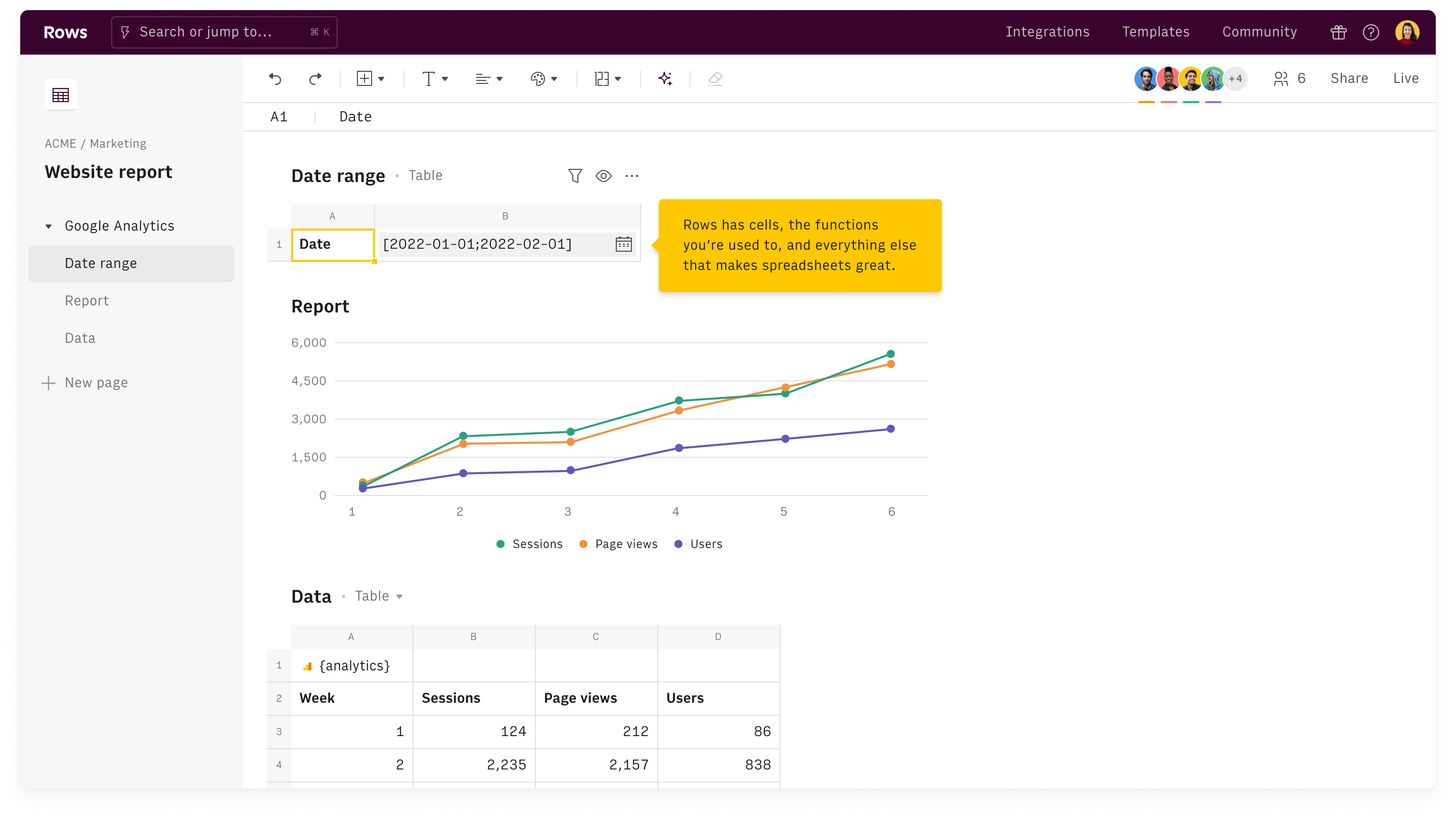
Rows bills itself as "the spreadsheet with superpowers." Their stated goal is to reimagine Google Sheets or Excel for the modern age. If you like Airtable's flexibility, but yearn for the powerful formulas of Excel, Rows is for you.
While Rows can handle a variety of use cases, its feature set is particularly tailored to sales and finance teams. Their "functions" (what Airtable calls "formulas") are incredibly powerful. They include autocomplete formulas, helpers, and wizard. Unlike Airtable, Rows lets you build charts directly on the page. This is great for sharing spreadsheets visually.
Like other tools on this list, Rows offers integrations with over 50 different tools. They also integrate with a handful of public databases. This makes it easy to pull outside data into your sheets.
3. Clay
Best for working with live data
Link: Clay
Clay launched publicly in February as the "spreadsheet that fills itself." Like most spreadsheets, you can fill Clay with data manually if you'd like. Clay's super powers though, come from its data source integrations.
Here's how it works:
- Pull in data to a spreadsheet from your other tools (like Webflow, LinkedIn, or Salesforce)
- Enrich the data in that spreadsheet with apps (like Clearbit or Mixpanel)
- Work with that data using formulas, filters, and automations
If you're just entering data manually, you may be better off with a tool like Airtable or Google Sheets. But if you're working with live lists of people, Clay is magical. This is particularly true if you're on growth, sales, or recruiting teams. By pulling in live data, Clay ensures your spreadsheets are always up-to-date. Using integrations, they let you combine data across tools for more insight.
4. Dataland
Best Airtable alternative for developers
Link: Dataland
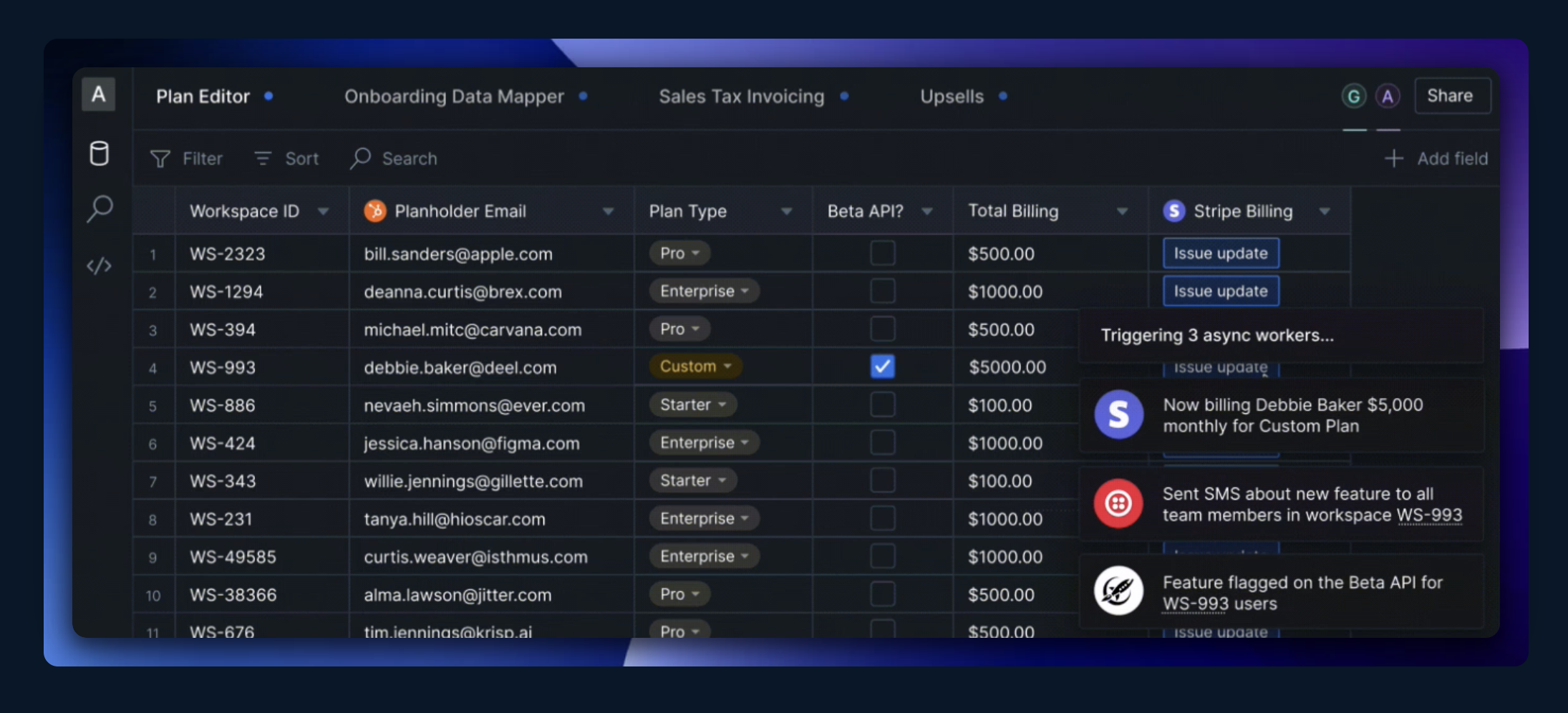
Airtable was born when Howie Liu asked why a spreadsheet couldn't behave more like a database. The Dataland team poses the opposite question - what if a database was as simple to use as Airtable?
In short, Dataland is building a powerful database with a no-code UI that anyone can use. On their homepage, you'll notice many of Airtable's most famous features. Think things like select fields and views. You'll also notice solutions to all the problems that limits Airtable as a true database. For example, with Dataland you'll never run into any record limits. Additionally, they give you access to full history retention and enforced table schemas.
The team behind Dataland is impressive. Built by ex-Palantir teammates and backed by YC. Not to mention the gorgeous UI they tease on their site. This is one Airtable competitor we're incredibly excited about.
5. Tulr
Best free Airtable alternative
Link: Tulr
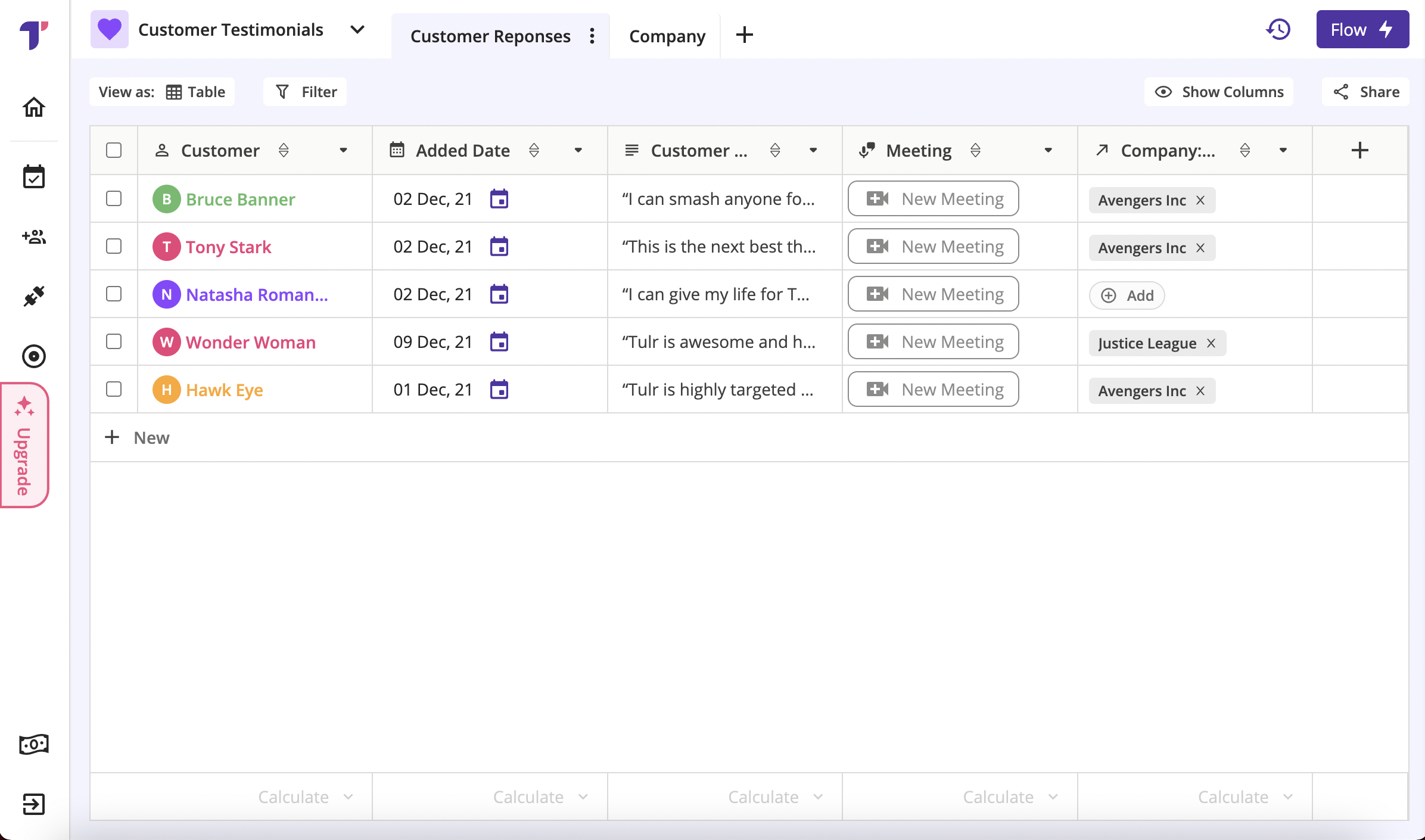
Tulr is a fascinating product. Like Airtable, the focus of Tulr is their spreadsheet. Here you can choose from 20+ column types and create views like Kanban, Calendar, or Forms.
Where Tulr becomes interesting is what they decided to build next. Instead of simply replicating Airtable's features, they've tried to surpass them. Tulr's Calendar lets you set automation rules and share links like Calendly. You can even save transcripts of your meeting notes. They also built a Loom-like feature where you can record your screen.
Tulr isn't compltely free. They make you pay $20/user/mo to access their automation features. That said, they offer a nice free plan with unlimited records. This compares favorably to Airtable's free plan which caps you at 1,200 records per base.
6. Stackby
Best Airtable alternative for marketers
Link: Stackby
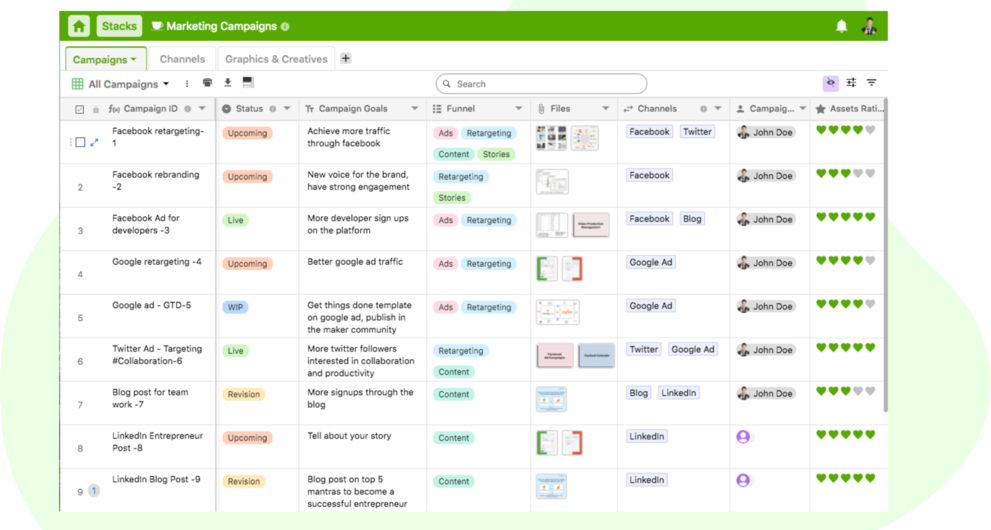
At first glance, Stackby looks like an Airtable knock-off you'd find in the discount bin. Upon further investigation, you'll find Stackby has a rightful place in the world.
Stackby's main draw is its APIs and automations. They offer column-level API automations, cell-level refresh, in-built automations, and reminders. You can read more about these features on their Airtable-comparison page.
All these features amount to a specific focus on marketing use cases. "Marketing" is the first team function they highlight in their Solutions dropdown. Same thing for their Use Cases tab. Many of the integrations they tout are with SEO tools like Semrush, Ahrefs, and Serpstat. If your use cases revolve around marketing, Stackby wants to be the end-to-end solution. Doc Williams breaks it down well in his YouTube comparison of Stackby and Airtable.
Outside of marketing and automations, Stackby lags a bit behind Airtable in its apps. Pricing is comparable although Stackby does offer some cheaper options for small teams. Additionally, Stackby allows you to book a demo call directly from their site which is a nice touch.
7. Basedash
Best for editing your own database
Link: Basedash
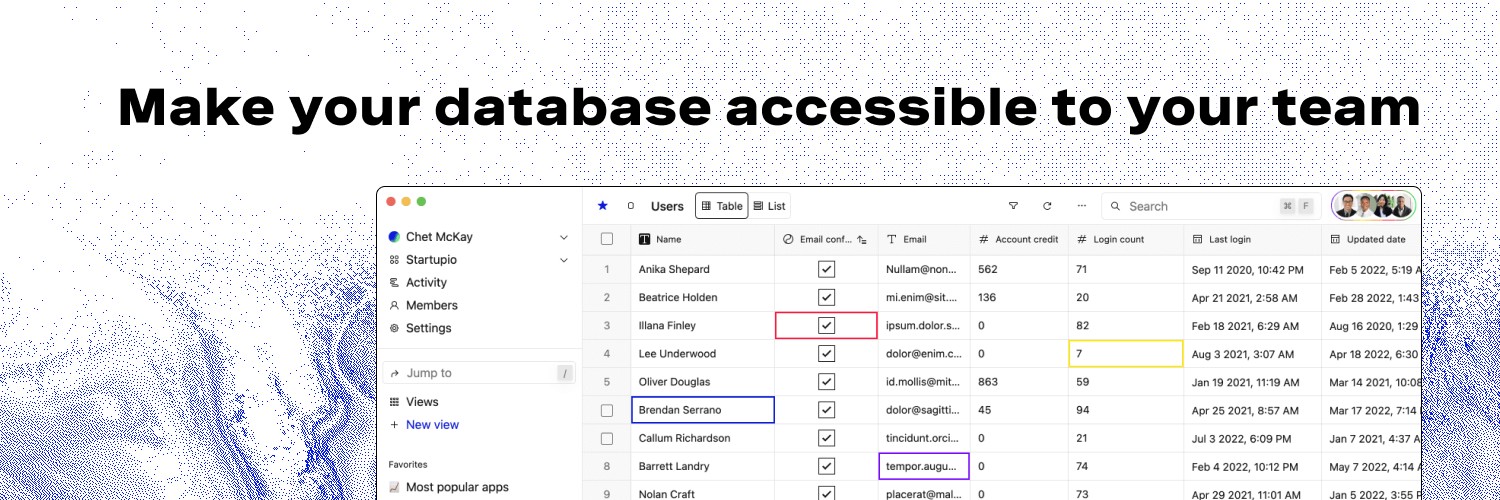
Basedash allows you to edit a traditional database as easily as a spreadsheet. In their words, "Basedash is the first database editor made for teams."
It works by connecting to any major SQL database. After that, you have an Airtable-like spreadsheet where you can manage your data. The UI is not quite as flexible as Airtable's when comes to things like filtering or creating views. But the reason you use Basedash is different than Airtable. Basedash gives you detailed activity logs and access control. It's a perfect choice if non-technical members of your team need access to data in your SQL databases.
We use Basedash at Whalesync and it's one of our favorite tools.
8. Grist
Best for hackers
Link: Grist
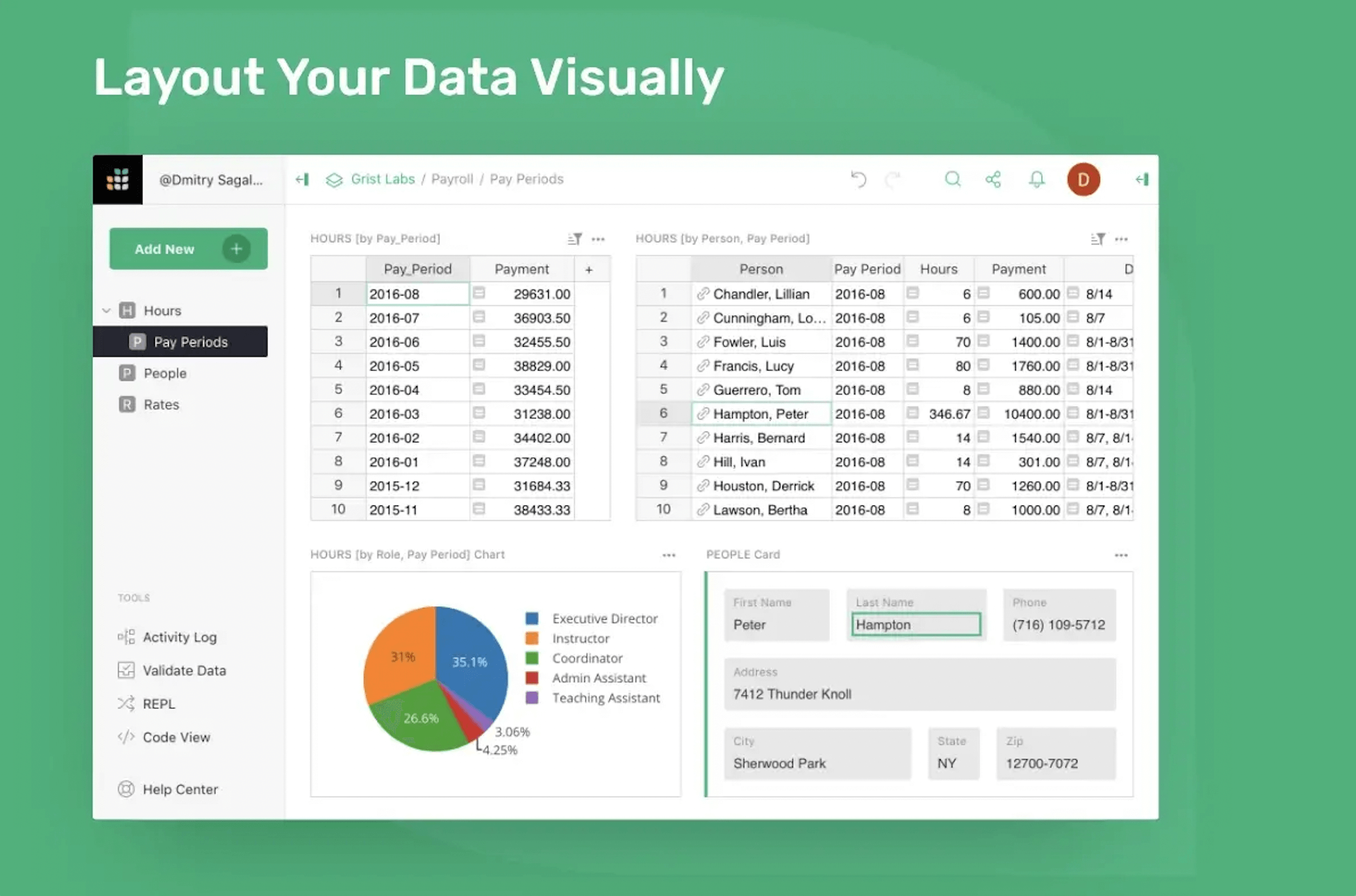
Grist is like a mix between Airtable, Google Sheets, and a BI tool. Whereas Airtable's vibe is friendly and playful, Grist feels more like a serious tool. The product revolves around a spreadsheet that looks like Google Sheets. Unlike Sheets, Grist lets you create views as well as relationships between tables.
Grist is not quite as intuitive as Airtable and doesn't offer as many options for views or field types. While it might be a tad harder to get started, Grist makes it up in its robustness as a database tool. Out of the box, Grist gives you access control rules, detailed document history, raw data, and a code view. They also offer many Excel functions which make it easy to build powerful formulas.
Grist calls themselves a "Hacker Friendly Spreadsheet" and we think it lives up to the name. They're not fully open source, but offer an open core version with over 3,000 stars on Github. If you're technical you can build custom widgets or views to power up your sheet. They also offer full Python syntax support, and a REST API.
Whether Grist is for you depends on your use case. For simple spreadsheet use cases, it might be best to stick with Airtable. If you're doing something more advanced, Grist's customizability can be powerful.
9. Smartsheet
Best Airtable alternative for enterprise
Link: Smartsheet
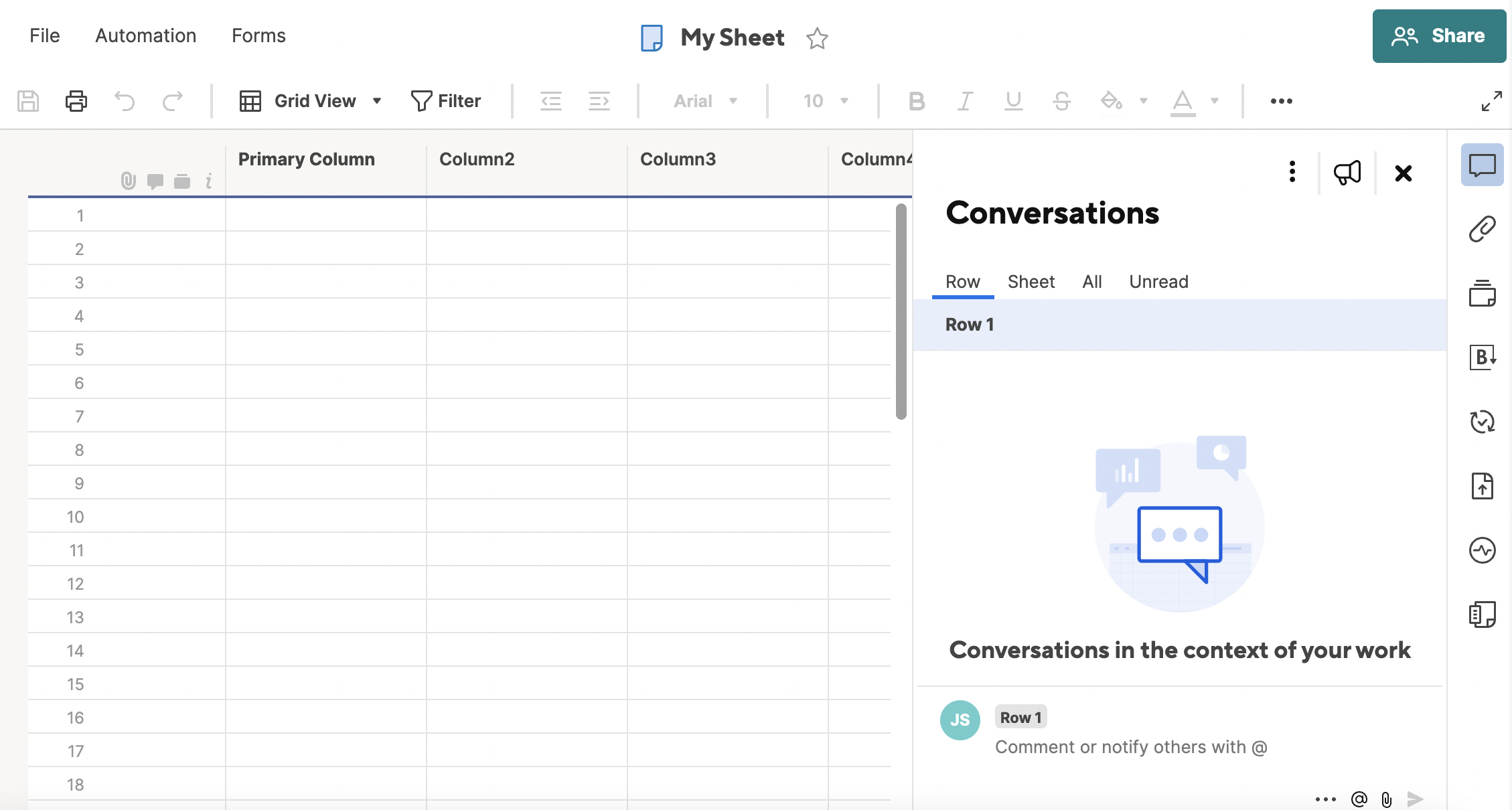
An untrained eye might see Airtable and Smartsheet as similar tools. They both revolve around spreadsheets and are popular for project management. At their core though, they have fundamental differences.
Airtable strives to be a flexible database for all use cases. Smartsheet focuses on project management. The product is most comparable to Google Sheets, but with built-in collaboration. They drive users to capabilities like dependencies, critical paths, and resource management.
Perhaps an even bigger difference is who these tools target. Airtable has gone bottoms-up, expanding from individuals and small startups into larger companies. Smartsheet is more explicitly focused on the enterprise. According to their site, over 75% of the Fortune 500 is a Smartsheet customer. Accordingly, they've prioritized integrations with large companies like Salesforce, Microsoft, and Google.
Ultimately, Airtable is much more flexible and customizable than Smartsheet. You can create all types of views, design your data model, and link records together. Not to mention its automation capabilities. Smartsheet shines if you're a larger org used to working with Excel or Google Sheets. They clearly see themselves as an Airtable competitor, just targeting different companies.
10. Actiondesk
Best for business intelligence
Link: Actiondesk
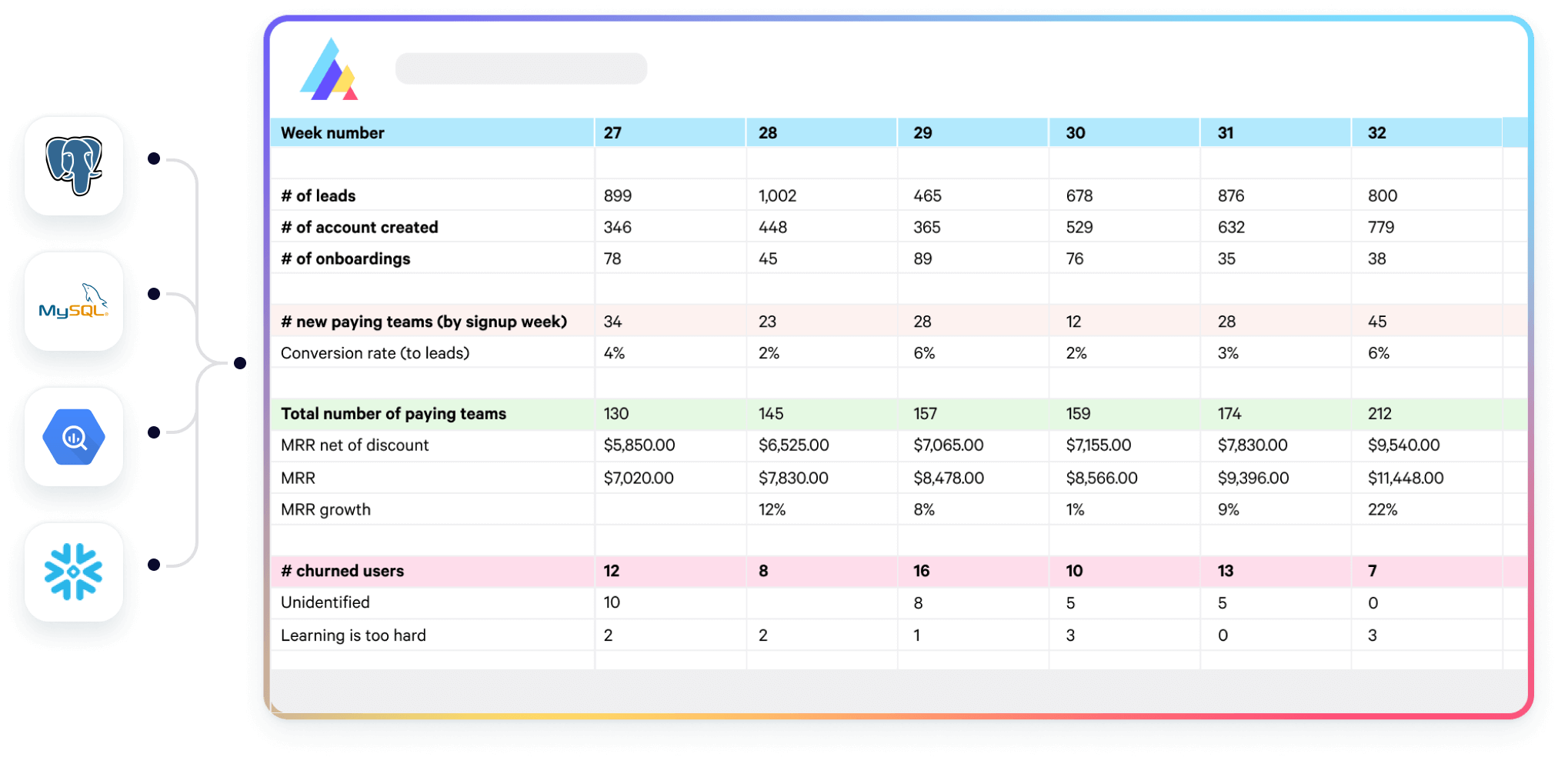
Actiondesk is similar to Airtable but with a heavy focus on business intelligence. Often times the place data is collected and the place analysis happens is not the same. Changes are you've experienced this problem firsthand. Data exists in your company's database or Airtable. You want to run analysis on that data, so you export it to a CSV and upload it to Google Sheets. Instead of that whole rigamarole, you can use Actiondesk. With Actiondesk, you connect to a data source, pull live data into a spreadsheet and then conduct BI.
Like many of the tools on this list, whether Actiondesk makes sense will depend heavily on your use case. You can check out a great breakdown from Actiondesk of the best spreadsheet tool for each use case. Their sweet spot is companies looking for a business intelligence tool with the flexibility of a spreadsheet. Actiondesk connects natively to external apps like Airtable, Stripe, and Hubspot. This gives live access to your data inside a spreadsheet. Out of the box, their BI tooling that lets you access, explore, and transform your data.
Honorable Mentions
Other great Airtable competitors that just missed out on making the cut.
Baserow
Link: Baserow
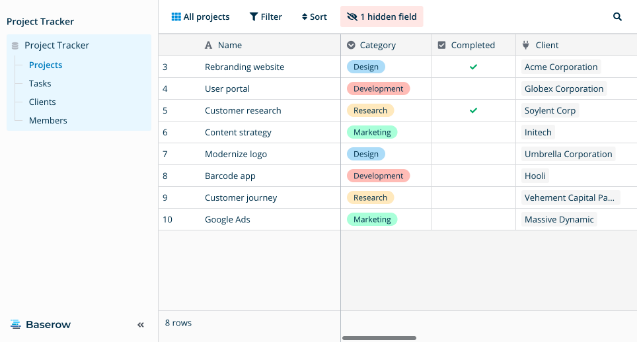
Baserow is another great open source Airtable alternative. Their 1,000 Gitlab stars don't quite compare to NocoDB's 27,000 on Github. But Baserow seems to be growing and building up a legitimate following. Their premium version, which includes additional features, is in early access.
Seatable
Link: Seatable
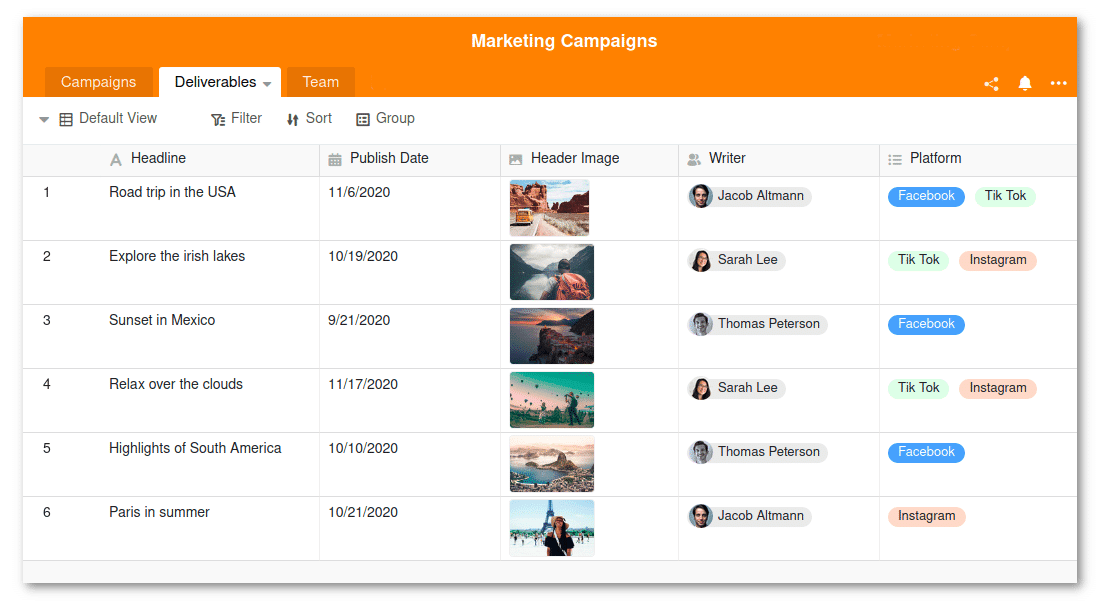
Seatable's UI is very similar to Airtable's. The main benefit of Seatable is that you can host the product yourself. They offer a cloud version hosted in Germany in addition to the self-hosted version.
Rowy
Link: Rowy
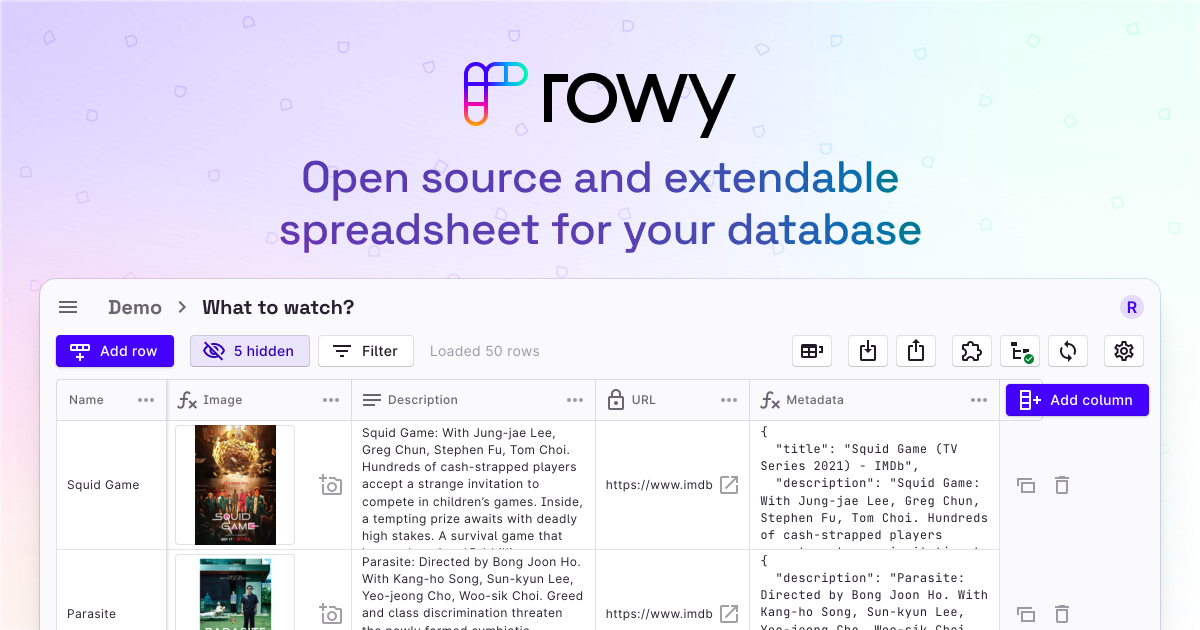
Rowy gives you an instant Airtable-like UI for managing your database. Specifically they're focused on Firestore. The product is open source and currently has over 3,000 stars on Github.
Xata
Link: Xata
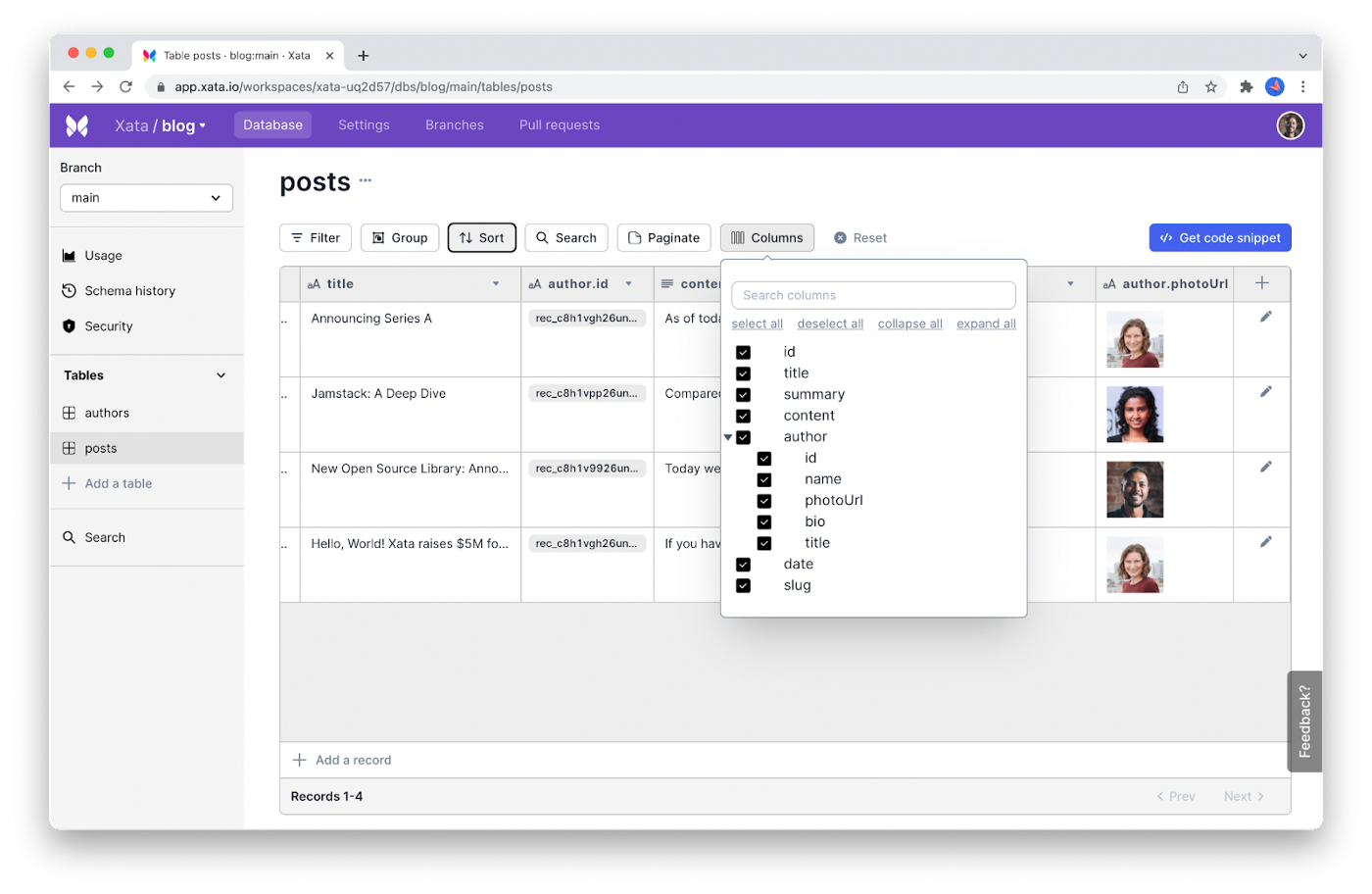
Xata is a serverless database built to feel like a spreadsheet. This is definitely a product that was built for developers. They recently raised a $30M Series A from Redpoint and Index Ventures.
Google Sheets
Link: Google Sheets
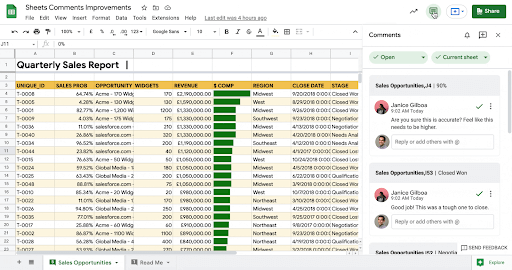
Good 'ol Google Sheets! We couldn't leave them off this list 🙂. Sheets is simple and accessible to pretty much anyone with a computer. It's also free. Where it lacks is in the ability to link records or create views.


Wow, this is a great collection! I have long been looking for an alternative for Airtable!
Maybe you could additionally give a price overview to complete the competitive analysis
Ooh - great idea! Yes, absolutely will need to include that in the next one.
Thanks a lot, excellent overview.
Have you also tried spreadsheet dot com? They seem quite active, too!
Oh wow! That's a great addition. Need to check them out as well.